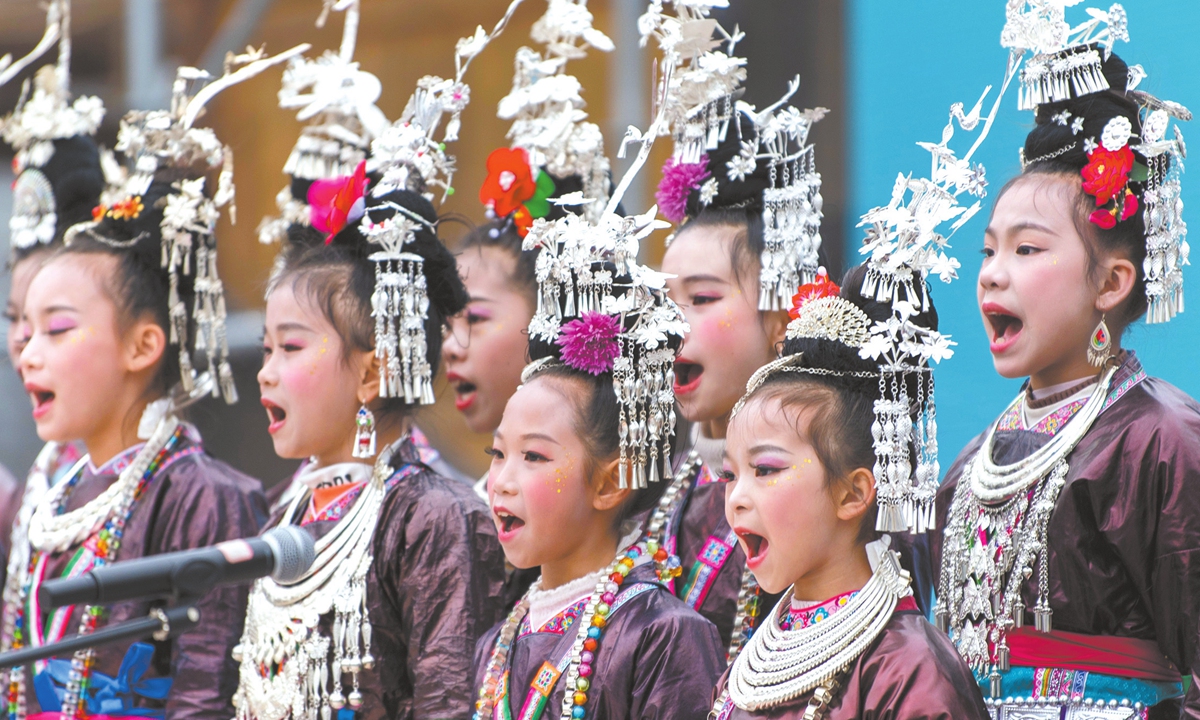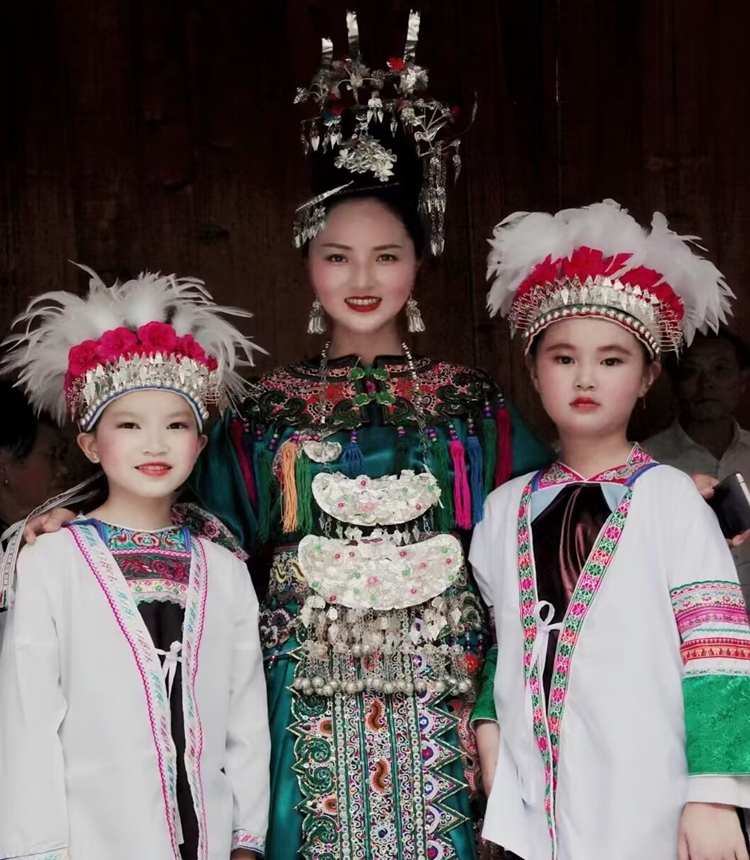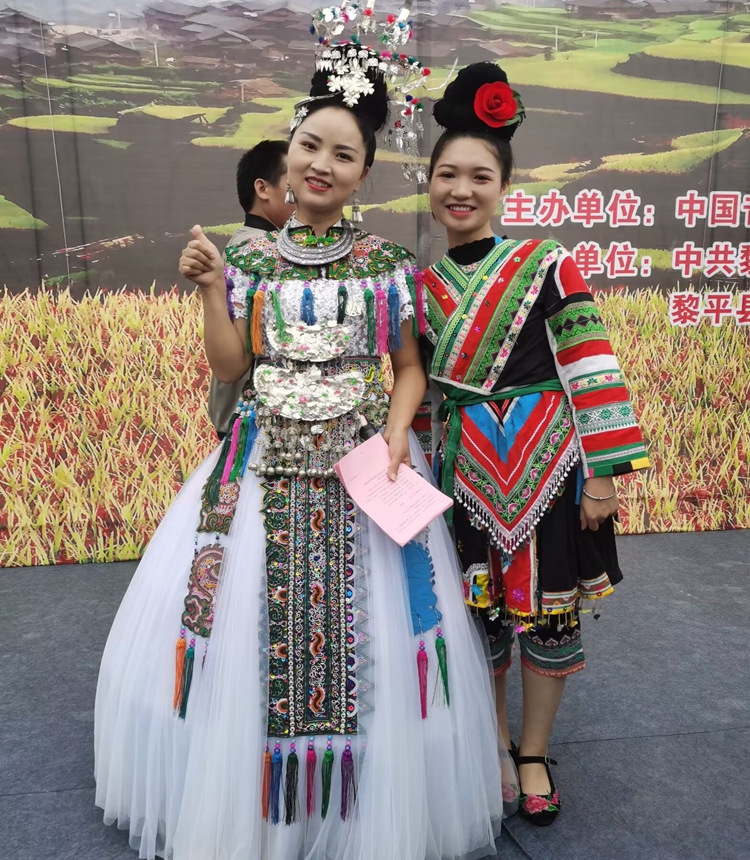
A village of Dong ethnic group Photo: VCG

Young performers of the Liping Grand Song of Dong ethnic group Photo: IC
Chinese President Xi Jinping watched a performance of the Grand Song of the Dong ethnic group, a form of a folk chorus inscribed on the UNESCO Intangible Cultural Heritage of Humanity list, in the Zhaoxing Dong Village in Liping County during his visit to the village in Southwest China's Guizhou Province on Monday.
"Stilt houses, ancient villages, intangible cultural heritage instruments, the grand song of the Dong people, and batik craftsmanship all embody the unique charm of this ethnic culture - both deeply traditional and remarkably stylish," Xi said, the Xinhua News Agency reported.
Zhong Shengli, one of the performers on Monday, told the Global Times that the Grand Song of Dong is not only a means of emotional expression but also a reflection of the wisdom of the Dong people.
The Grand Song, or known as Dongzu Dage, is a form of natural polyphonic choral music featuring rhyming lyrics and melodious tunes and performed without a conductor or instrumental accompaniment, Zhong noted.
The Grand Song primarily mimics the sounds of nature, such as birdsongs and flowing mountain streams. The songs are rich in content, encompassing various aspects of Dong people's lives, she said.
The Grand Song of Dong ethnic group was inscribed in the UNESCO's Representative List of the Intangible Cultural Heritage of Humanity in 2009.

The Grand Song artist Zhong Shengli Photo: Courtesy of Zhong Shengli
'Nourishing the soul'A popular saying among the Dong people in Guizhou Province has it that "rice nourishes the body and songs nourish the soul."
Born in a village predominantly inhabited by the Dong ethnic group and growing up surrounded by the enchanting melodies of the Grand Song of Dong, Zhong said she began learning to sing the song at a young age.
"During festivals and gatherings, the elders would sing these soulful songs, and I was deeply captivated by their beauty. After graduating from school, I continued to pursue my passion by working in an art troupe, said Zhong, who is head of Liping Grand Song of Dong Ethnic Group."
She was excited to share a recording saved on her phone of the art troupe's collaboration with renowned Russian singer Gleb Matveychuk on a rendition of Moscow Nights. As the performance unfolded, the crowd was clapping along to the rhythm, while cheers echoed through the Moscow sky.
In August 2024, the art troupe was invited to the Moscow A Capella festival and contest where they competed with more than 1,600 performers, soloists and groups from 13 countries, including Belarus, South Africa, Indonesia, Cuba and Angola. The troupe won third place in the category of "Large Vocal Groups" at the contest.
"In addition to the contest, we also staged flash mob performances and interactive exchanges in public spaces across Moscow. Through these performances, we showcase the rich diversity of ethnic culture of the Dong Grand Song to local residents and tourists alike," Zhong said.
Achieving good results in international competition demonstrates that the artistic value and cultural depth of the Dong Grand Song have been recognized globally. This enhances the cultural confidence of the Dong people of China, inspiring us to preserve and promote our rich traditions with even greater enthusiasm, according to Zhong.
Cultural resonanceThe Grand Song has also been under the spotlight recently thanks to its ethereal and sacred soundtrack featured in the Chinese animated film
Ne Zha 2, which secured the fifth spot on the all-time global box office charts on Saturday after crossing 15.1 billion yuan ($2.09 billion) in total earnings.
Zhong said the ethnic song gained widespread popularity because of its unique style and cultural resonance.
"The ethereal and harmonious polyphony of the grand song perfectly complements the film's fantastical and mysterious atmosphere, adding a unique artistic charm. The ethnic song carries the heritage and emotions of the Dong people, evoking a deep sense of cultural identity and belonging while resonating emotionally with viewers," she said.
Wu Qianfeng, a lecturer at the College of Tourism and Culture Industry of Guizhou University, told the Global Times on Wednesday that for the younger generation, experiencing a sense of cultural confidence through empathy with traditional culture is significant for the revitalization, sustainable development, and promotion of the intangible cultural heritage.
The Grand Song of Dong has been passed down for generations through master singers and organized singing groups.
Singing these songs is a central part of various Dong festivals and celebrations. As young people participate in these events, they are gradually immersed in the tradition, learning and mastering the grand song through experience and inspiration, Zhong said.
Zhong said popularity of
Ne Zha 2 has brought the Grand Song to a broader audience, sparking greater interest for this traditional art form.
Innovative approaches to traditional culture can breathe new life into ancient heritage, making it more relevant and appealing to modern society, particularly to younger generations. Such innovations contribute to the preservation and development of cultural traditions, she added.

The Grand Song artist Zhong Shengli Photo: Courtesy of Zhong Shengli







